The word “here” is what linguists call deictic expression, for having little meaning or use outside of the context in which it’s uttered, whether we use it to refer to a place or as a kind of verbal gesture when we offer somebody a gift. Bas Devos’s new film thinks of the word in both of those contexts, as it tells a story that’s equally about environs and giving. It’s as if Devos conceptualizes the camera as an extension not just of the eye, but of the finger, a mechanism for pointing at things and saying, “here,” in both senses of the word.
Here is as delicate and unobtrusive a film as Devos’s previous cinematic journey through Brussels, Ghost Tropic. The story gently, elliptically slides from setting to setting as Stefan (Stefan Gota), a Romanian construction worker on the cusp of his summer vacation, delivers containers of soup whipped up from the remaining fresh food in his fridge to his friends around town. His journey overlaps and eventually intersects with that of Shuxiu (Liyo Gong), a Chinese-Belgian botanist whose musings on the pseudo-relationship between words and things begins in voiceover some minutes before she actually appears in the film.
Devos sets Shuxiu’s diaristic monologue to an ambulatory montage of tall grasses, mosses, and treetops shot from below, proceeding with methodical stillness through this verdant, lightly rustling space. From this imagery we make our way back to humans, following Shuxiu to one of her lectures before cross-cutting back to Stefan’s next delivery. Eventually, the two characters’ paths cross at Shuxiu’s family’s restaurant, and Here starts to become something of a love story.
Stefan’s quest is interwoven with Shuxiu’s day and is liable to be subordinated to his excursions through areas of Brussels where human construction surprisingly resides alongside pockets of nature. Both natural and constructed elements are lent an elegant beauty by the rich but subtle tones of the cinematography and the sparse score, mainly consisting of gently plucked guitar strings, underscores some of those quieter moments. Devos’s use of music intervenes just enough to set a tone but stops short of seizing the reins of meaning from the image itself.
Devos’s trademark placidity and restraint constitutes a challenge to narrative convention. Images of Brussels and its nature-cultures are allowed to have a beauty of their own, both within and apart from the narrative. And though we take a keen interest in the lives of his human characters, we’re never led to presume they’re at the center of things. In a certain sense, then, Here is obtrusive indeed. It thrusts a contemplation of worldliness into our hands with all the bald simplicity with which one might extend an unexpected container full of soup to a friend.
The people we meet along Stefan’s soup route—their knowledge, their experiences—help comprise this environment, and this is one key idea of Devos’s film. Knowledge of the world takes a number of forms throughout, from Shuxiu’s study of moss to what’s gleaned from the exchanges between Stefan and the people he gives soup to. An older relation (Teodor Corban) of Stefan’s recounts, in an extended close-up, the uncanny experience of being anesthetized for major surgery and the vivid dreams that followed. The man’s description of this unsettling temporal experience elicits a pensive, almost forlorn reaction from Stefan.
Devos understands that the ways of collecting knowledge about the world are a part of the world themselves. In Here, microscopic close-ups of plant cells as seen in Shuxiu’s lab have the same status as lingering shots of bridges, fences, and people. The film shows how nature, culture, thoughts, and knowledge are interwoven into the rich tapestry of Stefan’s life. And it doesn’t neglect wonder, as in the subplot (if it can be called that) involving mysterious seeds that Stefan finds in his pocket that at one point glow with an otherworldly green, or the way he appears to have a dream that foretells a later journey through the woods with Shuxiu.
However contemplative and self-consciously arty Here can be, the contours of a psychologically motivated story emerge. Despite the caring community that surrounds Stefan in Brussels, we gradually pick up that something is amiss. We see him struggling to sleep in an early scene and, much later, he speaks about his insomnia and uncertainty about the future with his sister, Anca (Alina Constantin), an exhausted nurse. He reveals to her that he doesn’t know when or even if he’ll come back from his forthcoming trip to Romania, and from that point it’s plain to see that not just generosity, but a kind of dissatisfaction permeates the sequences that follow him.
Establishing a deeper connection with the world—whether through exchanging stories with the recipients of his soup, exploring the lush forest on the outskirts of Brussels, pursuing a budding romance with a fellow immigrant, or a combination of the three—appears to be a potential cure for what ails Stefan. Here presents this theme with a modesty that seems to radiate from Stefan himself, offering his world to us through rich, dreamy imagery and with an endearing simplicity.
Since 2001, we've brought you uncompromising, candid takes on the world of film, music, television, video games, theater, and more. Independently owned and operated publications like Slant have been hit hard in recent years, but we’re committed to keeping our content free and accessible—meaning no paywalls or fees.
If you like what we do, please consider subscribing to our Patreon or making a donation.





